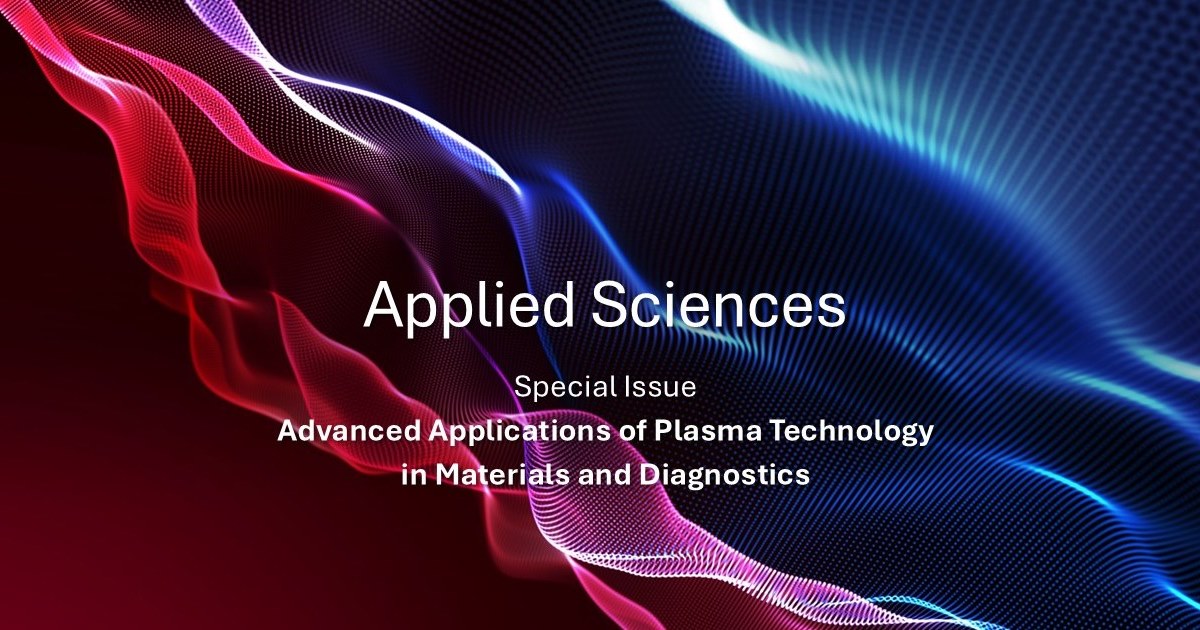Advanced Applications of Plasmas Technology in Materials and Diagnostics
A special issue of Applied Sciences (ISSN 2076-3417). This special issue belongs to the section "Applied Physics General".
Deadline for manuscript submissions: 31 March 2026 | Viewed by 514

Special Issue Editors
Interests: atomic and nuclear physics; plasma technology; spectroscopy; material science
Special Issues, Collections and Topics in MDPI journals
Special Issue Information
Dear Colleagues,
Plasma technology has various applications in materials science and diagnostics; for example, controlled plasma treatment can be used to alter and enhance the surface properties of materials or to create entirely new functionalities. Plasma-based techniques have become essential for the production of microelectronics and are used to synthesize various nanomaterials and thin films. The biomedical application of plasma technology is equally important, if not more so, especially in terms of microbiological inactivation, food quality preservation, the extraction of bioactive components in the food industry, and water purification. Plasma-based diagnostic techniques including plasma spectroscopy are used to analyze material composition, determine plasma parameters, for real-time monitoring and control, and for process optimization. Combining plasma technology with other technologies and diagnostic techniques can increase treatment efficacy and expand the field of applications.
The aim of this Special Issue is to gather together original research and review articles on the latest applications of plasma technology in materials science, diagnostics, monitoring, control, and optimization. Potential areas of interest include, but are not limited to, the following topics:
- Material modification;
- Applications in industry, agriculture, biomedicine, or food processing;
- Experimental measurement;
- Methods and diagnostic techniques for material composition analysis.
Dr. Sanda Pleslić
Dr. Nadica Maltar-Strmečki
Guest Editors
Manuscript Submission Information
Manuscripts should be submitted online at www.mdpi.com by registering and logging in to this website. Once you are registered, click here to go to the submission form. Manuscripts can be submitted until the deadline. All submissions that pass pre-check are peer-reviewed. Accepted papers will be published continuously in the journal (as soon as accepted) and will be listed together on the special issue website. Research articles, review articles as well as short communications are invited. For planned papers, a title and short abstract (about 100 words) can be sent to the Editorial Office for announcement on this website.
Submitted manuscripts should not have been published previously, nor be under consideration for publication elsewhere (except conference proceedings papers). All manuscripts are thoroughly refereed through a single-blind peer-review process. A guide for authors and other relevant information for submission of manuscripts is available on the Instructions for Authors page. Applied Sciences is an international peer-reviewed open access semimonthly journal published by MDPI.
Please visit the Instructions for Authors page before submitting a manuscript. The Article Processing Charge (APC) for publication in this open access journal is 2400 CHF (Swiss Francs). Submitted papers should be well formatted and use good English. Authors may use MDPI's English editing service prior to publication or during author revisions.
Keywords
- plasma technology
- plasma spectroscopy
- plasma-based diagnostic techniques
- plasma source characterization
- plasma instrumental parameters and setups
- plasma theory and modeling
Benefits of Publishing in a Special Issue
- Ease of navigation: Grouping papers by topic helps scholars navigate broad scope journals more efficiently.
- Greater discoverability: Special Issues support the reach and impact of scientific research. Articles in Special Issues are more discoverable and cited more frequently.
- Expansion of research network: Special Issues facilitate connections among authors, fostering scientific collaborations.
- External promotion: Articles in Special Issues are often promoted through the journal's social media, increasing their visibility.
- Reprint: MDPI Books provides the opportunity to republish successful Special Issues in book format, both online and in print.
Further information on MDPI's Special Issue policies can be found here.






